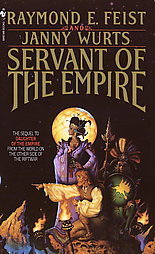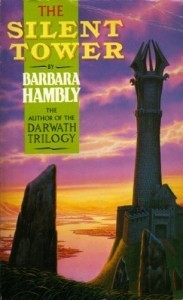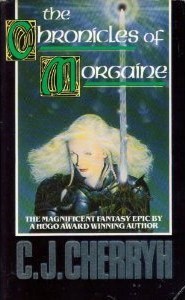More Thoughts on Epic Fantasy
I finished my Monday post, More on Epic Fantasy, with:
"So does a book have to be about large-scale war to qualify as epic fantasy? I don't believe so, but I do feel its has to encompass, in some way, the grand sweep of events—and large-scale war can serve as convenient shorthand for that."
In between times, while I've been dwelling in the realm of Tuesday Poem (where our first anniversary group composition is about the myth of the Norse god Tyr and the wolf, Fenris—how epic is that?) I have been mulling over this question. Most particularly, I have been trying to think of individual books and/or series that I would categorise as epic fantasy that aren't about large-scale war. And have actually found the exercise quite, well, exercising, given that my criteria are that, in order to be epic, a story must encompass some or all of:
" … the epic sweep of events, encompassing nations, cultures and the "winds of change sweeping through the corridors of power" [or "world altering" as Ted Cross perhaps better expressed it in his comment on my post]—in whatever way seems appropriate to the context of the story."
So here's my "top 3″ contenders so far (and yes, I would love to hear your suggestions as well):
 Janny Wurts and Raymond E Feist's
Empire
trilogy comprising A Daughter of the Empire, Servant of the Empire and Mistress of the Empire. Although there is a large-scale war going on in the background of the first and (I'm pretty sure) second books, this is very much 'remote backdrop' and not pertinent to the central story, which is all about the "game of the council" (ie politics and socio-political manipulation and machination within the empire of Tsurani.) But the success of the central character, Mara of the Acoma, and the outcome of her influence on the game of the council is widespread socio-political change in the empire. Coupled with the epic sweep of the trilogy, I feel that definitely places the Empire series in the epic fantasy camp.
Janny Wurts and Raymond E Feist's
Empire
trilogy comprising A Daughter of the Empire, Servant of the Empire and Mistress of the Empire. Although there is a large-scale war going on in the background of the first and (I'm pretty sure) second books, this is very much 'remote backdrop' and not pertinent to the central story, which is all about the "game of the council" (ie politics and socio-political manipulation and machination within the empire of Tsurani.) But the success of the central character, Mara of the Acoma, and the outcome of her influence on the game of the council is widespread socio-political change in the empire. Coupled with the epic sweep of the trilogy, I feel that definitely places the Empire series in the epic fantasy camp..
 My second pick was Barbara Hambly's
Windrose
trilogy: The Silent Tower, The Silicon Mage and
Dog Wizard
. Once again, the story does not revolve around large-scale war but there is considerable sweep of events in terms of the use and abuse of power, stresses within a society of wizards and witchfinders, and a quest to save not only the world but prevent the death of the universe—I do think that qualifies as fairly epic stuff.
My second pick was Barbara Hambly's
Windrose
trilogy: The Silent Tower, The Silicon Mage and
Dog Wizard
. Once again, the story does not revolve around large-scale war but there is considerable sweep of events in terms of the use and abuse of power, stresses within a society of wizards and witchfinders, and a quest to save not only the world but prevent the death of the universe—I do think that qualifies as fairly epic stuff..
 My third choice is CJ Cherryh's
Chronicles of Morgaine
(comprising Gates of Ivrel, Well of Shuian and Fires of Azeroth) in which the sweep of events is definitely epic and the heroine effectively a "half-elf" (in type, that is not how she is styled in the book) with a highly destructive sword (Changeling) on a quest to save the universe by destroying the time-traveling gates that will otherwise unravel it. While I concede that the premise of the story is fundamentally science fiction, the action is primarily psychological and ethical, and both the culture of the story and the technologies of the worlds Morgaine visits (in order to destroy their gates) are all low tech and quasi-medieval. So I always think of Morgaine as epic fantasy—and I understand the author does, too, so I'm going to stick with that.
My third choice is CJ Cherryh's
Chronicles of Morgaine
(comprising Gates of Ivrel, Well of Shuian and Fires of Azeroth) in which the sweep of events is definitely epic and the heroine effectively a "half-elf" (in type, that is not how she is styled in the book) with a highly destructive sword (Changeling) on a quest to save the universe by destroying the time-traveling gates that will otherwise unravel it. While I concede that the premise of the story is fundamentally science fiction, the action is primarily psychological and ethical, and both the culture of the story and the technologies of the worlds Morgaine visits (in order to destroy their gates) are all low tech and quasi-medieval. So I always think of Morgaine as epic fantasy—and I understand the author does, too, so I'm going to stick with that.So what do you think: do you agree that my 3 picks qualify as examples of epic fantasy that don't involve large-scale war? Disagree? Have a top three of your own? (Just remember that to qualify these fantasies have to be epic in scope, as above, and not about large-scale war.)



